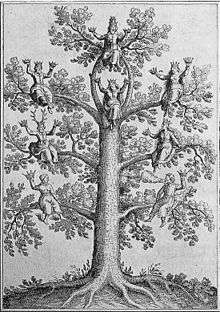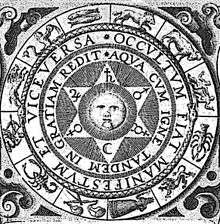Johann Daniel Mylius
Johann Daniel Mylius (c. 1583 – 1642) was a composer for the lute, and writer on alchemy. Born at Wetter in present-day Hesse, Germany, he went on to study theology and medicine at the University of Marburg. He was the brother-in-law and pupil of Johann Hartmann (1568–1613).[1]

Illustration from Mylius' 1628 Anatomia auri

Illustration from Mylius' 1618 Opus medico-chymicum
In 1616, while still a medical student, Mylius published Duncan Burnet's Iatrochymicus.[2] The Opus medico-chymicum, Mylius' own alchemical work, was published two years later. He is known for the collection Thesaurus gratiarum (1622) of pieces for the lute.[3] In the same year his Philosophia Reformata was published.[4] Mylius was the personal physician of Moritz of Hessen and his patrons included Maurice and Frederick Henry of Nassau.
Works
- Opus medico-chymicum. 1618.
- Antidotarium. 1620.
- Philosophia reformata. 1622.
- Anatomia auri. 1628.
- Danielis Milii Pharmacopoeae spagyricae, sive Practicae universalis Galeno-chymicae libri duo. - Francofurti : Schönwetter, 1628. digital edition
gollark: Oh <:bees:724389994663247974>.
gollark: You WOULD say that, wouldn't you.
gollark: ↑ LyricLy, utterly.
gollark: HelloBoi, CEASE `set!` usage and RECURSE ELEGANTLY¡!!!!!
gollark: * helloboious
References
External links
| Wikimedia Commons has media related to Johann Daniel Mylius. |
This article is issued from Wikipedia. The text is licensed under Creative Commons - Attribution - Sharealike. Additional terms may apply for the media files.